 During one of the brief entr’acte pauses in yesterday afternoon’s performance of Otello at San Francisco Opera, an elderly lady sitting close to me said to her friend: “The sets look cheap. But at least they’re not skimping on the singing.”
During one of the brief entr’acte pauses in yesterday afternoon’s performance of Otello at San Francisco Opera, an elderly lady sitting close to me said to her friend: “The sets look cheap. But at least they’re not skimping on the singing.”
Coming from a rather prim-looking person with carefully manicured hair and a tidy suit, the directness of this comment made me want to laugh out loud.
But the lady actually made an astute point: SF Opera, like pretty much all the other arts institutions around here, has been going through some incredibly tough fiscal times of late. The company has been forced to reign in its spending and the main target areas of the cost-cutting strategy can easily be discerned from Otello.
The company does indeed look like it’s been saving on visual spectacle, which to my mind isn’t a bad thing. John Gunter’s production design basically uses a single set — a bare stage surrounded by several layers of simple wooden balconies with perforated walls through which Duane Schuler’s atmosphere-underscoring lighting design casts shadows. In the final act, white sheeting covers up the wood and a bed is placed center-stage with drapery around it. That’s about it. There are no expensive revolving sets or very complicated set changes.
The sets look slightly tacky, it’s true. But I would much rather have a bare stage and excellent acting and musicianship than terrible performances and pretty special effects. In this respect, SF Opera does audiences proud.
Otello has become a signature role for the South African tenor Johan Botha, who has performed the role at the Met, Vienna State Opera and Frankfurt Opera. Botha is massive in bulk, but he nevertheless manages to convey the Moor’s delicate mental state. He rampages through the schizophrenic highs and lows of his character with fiery bravura and wounded pride. Marco Vratogna’s serpentine Iago is a force of nature. Verdi grants this character some of the most melodious arias in the opera and the Italian baritone cruises slickly through every note, thus making his character as likable as he is evil. As Desdemona, Zvetelina Vassileva is like a beam of light. The Bulgarian soprano’s unadorned approach to her character’s arias pluck at the heartstrings. Though her lower register is lacking in color and power (a shame as quite a bit of Desdemona’s part sits low in the voice) the radiance of the upper echelons cuts through darkness that enshrouds her scenes with Otello.
It’s great that SF Opera isn’t skimping on talent. On the other hand, it would be more interesting to see the company experiment a little more. An emphasis on rolling out the big guns — singers who’ve been tried and tested in roles before — over creating interesting new matches between singers and roles, or maybe even putting someone entirely fresh under the spotlight, speaks of too much safety at the expense of creativity. And the 2009-2010 season’s heavy emphasis on warhorses of the Italian repertoire similarly underlines the company’s anti-risk strategy.
I can understand what’s motivating these decisions of programming and casting. They make a lot of sense in this economic climate. And as I mentioned above, at least the company is maintaining a high quality in terms of performances. But it would be great to see a little more risk taking, even in these risky times.

 The Great Dickens Christmas Fair
The Great Dickens Christmas Fair Joe Sample and Lalah Hathaway
Joe Sample and Lalah Hathaway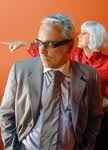 The Bald Soprano
The Bald Soprano Sing-a-Long Sound of Music
Sing-a-Long Sound of Music Ari Marcopoulos – Within Arm’s Reach
Ari Marcopoulos – Within Arm’s Reach


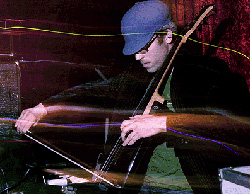 Cellos generally used to be found in orchestras and chamber music groups. But these days, the instrument seems to be appearing increasingly in other musical settings. And what’s really interesting about the advent of the cello on the bluegrass, electronica, folk and rock scenes is that the instrument is being played like it’s part of the percussion / rhythm section rather than the string section.
Cellos generally used to be found in orchestras and chamber music groups. But these days, the instrument seems to be appearing increasingly in other musical settings. And what’s really interesting about the advent of the cello on the bluegrass, electronica, folk and rock scenes is that the instrument is being played like it’s part of the percussion / rhythm section rather than the string section. I’m getting really tired of going to the theatre and witnessing plays that take pot shots at the most obvious people. Tony Kushner’s series of rambling, politically-slanted short plays currently playing at
I’m getting really tired of going to the theatre and witnessing plays that take pot shots at the most obvious people. Tony Kushner’s series of rambling, politically-slanted short plays currently playing at 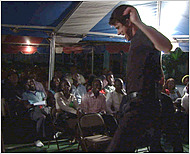 The San Francisco-based theatre artist Dan Hoyle’s
The San Francisco-based theatre artist Dan Hoyle’s 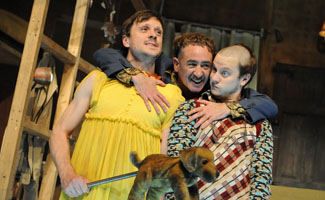 There are a few elements in Irish dramatist Enda Welsh’s play The Walworth Farce — currently on tour in the US in a
There are a few elements in Irish dramatist Enda Welsh’s play The Walworth Farce — currently on tour in the US in a  If a comet were to crash into the Earth, it would make quite a dent.
If a comet were to crash into the Earth, it would make quite a dent. Artists are becoming very savvy about marketing themselves these days. Everyone’s out there on FaceBook and MySpace and Twitter sending out news about their work and related upcoming events to generate interest and hopefully sell tickets.
Artists are becoming very savvy about marketing themselves these days. Everyone’s out there on FaceBook and MySpace and Twitter sending out news about their work and related upcoming events to generate interest and hopefully sell tickets.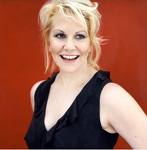
 …is it possible to walk down the street swinging a yoga mat and be accosted by a homeless person pushing a Safeway cart in grimy clothes who says: “Pilates?” by way of introduction.
…is it possible to walk down the street swinging a yoga mat and be accosted by a homeless person pushing a Safeway cart in grimy clothes who says: “Pilates?” by way of introduction. San Francisco is probably the most sexually tolerant city in the world. There are few places where people can walk around in nothing but socks and sneakers with bells dangling from their privates without getting arrested and San Francisco is one of them. Ironically, the fact that the city is so gay-friendly makes the latest work by the luminescent British physical theatre company
San Francisco is probably the most sexually tolerant city in the world. There are few places where people can walk around in nothing but socks and sneakers with bells dangling from their privates without getting arrested and San Francisco is one of them. Ironically, the fact that the city is so gay-friendly makes the latest work by the luminescent British physical theatre company